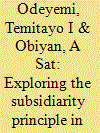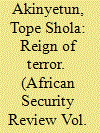|
|
|
Sort Order |
|
|
|
Items / Page
|
|
|
|
|
|
|
| Srl | Item |
| 1 |
ID:
193045


|
|
|
|
|
| Summary/Abstract |
On 20 October 2020, the military and police force opened fatal shootings at peaceful unarmed #EndSARS protesters. This article examines the political and socio-economic undercurrents of #EndSARS protest. It argues that the predatory state–society relations where the state is the predator and citizens are the preys nurtured the increasing distrust between the state and its citizens, and ultimately, resulted in the deepening mutual mistrust between the police and people. The article concludes that the #EndSARS protest created opportunity for the Nigerian state to accelerate and accumulate its bourgeoning repressive character instead of reducing it. It recommends symbiotic state–society relations.
|
|
|
|
|
|
|
|
|
|
|
|
|
|
|
|
| 2 |
ID:
160219


|
|
|
|
|
| Summary/Abstract |
The provisions of the 1999 Constitution, which recognises the existence of a single police force and forbids parallel police organisations, have oftentimes generated controversies among actors in the Nigerian federal polity. Rising insecurity precipitates lingering questions on the utility and adequacy of a single, highly centralised and centrally controlled police force given Nigeria’s geographic vastness and demographic diversity. Conversely, arguments have also dwelt on the dangers of fragmentation considering Nigeria’s psychosocial, economic and political nature. This article attempts to balance these arguments by analysing policing and the operations of the Nigeria Police Force (NPF) through the lens of the subsidiarity principle. Subsidiarity is a governance principle in federations, captured in the founding documents of the European Union (EU), which prescribes that governmental powers, authorities and duties should be held by the tier that can best perform them equitably, efficiently, effectively, suitably and based on interest and need. Drawing largely on interviews with purposively selected police scholars, political actors, civil society organisations and police personnel, the paper contends that this principle offers a pragmatic solution to the perennial problems of intergovernmental frictions on the use of the police within the context of governance in the Nigerian federation.
|
|
|
|
|
|
|
|
|
|
|
|
|
|
|
|
| 3 |
ID:
182435


|
|
|
|
|
| Summary/Abstract |
Few days after Nigeria attained the sexagenarian status on October 1, 2020, the country has once again become a subject of unusual discourse both home and abroad. This is due to the protests by disgruntled youths against the activities of the Special Anti-Robbery Squad; a unit of the Nigeria Police Force, which has been accused of brutality, human rights violation, sexual abuse, torture, and extrajudicial killings among others. This study adopts a qualitative approach which draws data from reports of reputable international organisations, juried scholarly articles, working papers, and newspaper articles. The study concludes that the police adopts brutality, abuse, and violations as its tactics due to its inadequate equipment for investigation which makes officers deploy torture as a means of extracting the truth. This is further complicated by an ingrained culture of corruption, inadequate funding, political interference, inadequate personnel, and a pro-elite orientation. As a result, it is recommended that a sincere and comprehensive reform of the police be carried out to improve the welfare of the police; encourage the use of extensive technology, and improve police-community relations.
|
|
|
|
|
|
|
|
|
|
|
|
|
|
|
|
|
|
|
|
|